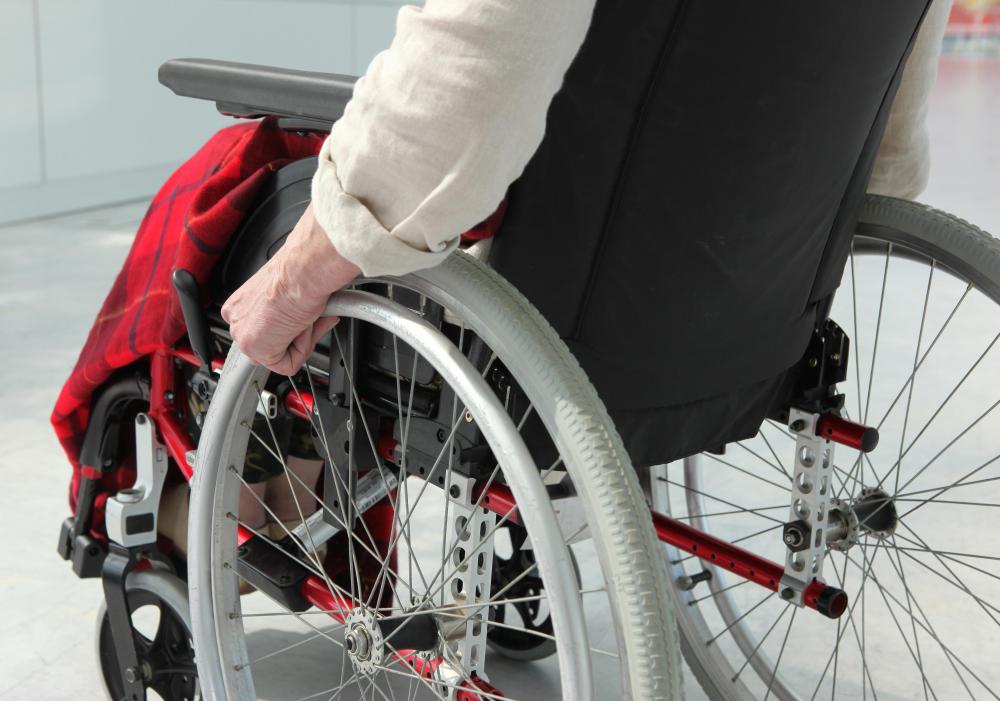At WiseGEEK, we're committed to delivering accurate, trustworthy information. Our expert-authored content is rigorously fact-checked and sourced from credible authorities. Discover how we uphold the highest standards in providing you with reliable knowledge.
What is Ableism?
Ableism is a form of discrimination in which preference is shown to people who appear able-bodied. The language surrounding the definition of ableism is almost as charged as ableism itself, as many definitions rely on ideas like “normal” people as opposed to those who are “abnormal,” which raises the ire of activists. Some disabled activists even dislike the term “ableism,” preferring to use “disabilism,” which enforces the idea that this form of discrimination involves the targeting of people with obvious physical or mental disabilities.
This term appears to have originated in the early 1980s, around the time that people with disabilities became much more politically and socially active. Historically, disability had been a cause of shame and fear, but thanks to the protest movements of the 1960s and 1970s in which people of color and women started fighting for their rights, the disabled community was inspired to follow suit. The rise of the AIDS virus in the West also created ample fodder for disabled activism, eventually leading to the passage of the Americans with Disabilities Act of 1990, a groundbreaking piece of legislation in the fight against ableism.

Like other “-isms,” ableism can be insidious, and so closely woven in society that people without obvious physical or mental disabilities might not even think about their ableist attitudes and the ableist structure of their society. For example, people with use of their legs may not consider how difficult navigation can be in a wheelchair. Albeism also penetrates language and society; terms like “weak,” “lame,” and “retarded” are all ableist, and widely used, even by people who are sensitive to other forms of discrimination.

Ableism can make it hard for someone to get a job, force students out of some universities and colleges, create social barriers, and make basic life tasks very frustrating, especially for disabled individuals who want to live independent, active lifestyles. This form of discrimination also highlights the difference between people with obvious physical disabilities, like amputees, and people with hidden disabilities, like medical conditions which cause chronic ill-health without an outward manifestation of disability.

Organizations designed to fight ableism can be found all over the world, working in a variety of ways to combat the various forms of ableism. Many of these groups fight for inclusive accessibility, encouraging mandates to make public spaces accessible to people of all levels of physical ability, and they also fight against discriminatory practices in the workplace and in college admissions. They also perform outreach education to connect abled and disabled people.

Individuals can also fight ableism, by reflecting on ableist attitudes which they may have and working to correct these attitudes. For example, the use of ableist terms could be avoided as carefully as people avoid racial epithets, and assumptions about the skills, abilities, and mental state of people with disabilities can be combated by interacting directly with the disabled community.
AS FEATURED ON:
AS FEATURED ON:















Discussion Comments
I understand the danger and problem with ableist thinking and speech; using 'retarded' or 'gimp' as an insult, for instance, or treating a disabled person differently from a non-disabled person in a professional or academic sphere.
On the other hand, the requirements that are put on businesses can sometimes be too much of a burden to bear. A person who wants to start a restaurant in an old building may not be able to afford to do major reconstruction to add a handicap bathroom, wider hallways, or ramp/elevator. It has nothing to do with trying to discriminate against a group of people; it is just financially impossible for some small business owners to accommodate everyone, which discourages people from starting such businesses in the first place. Or a small manufacturing factory started by friends and only employing a handful of people already known to each other is still forced to follow the same disability regulations as a larger company with much more space and funds.
With other kinds of discrimination, laws forcing the discriminated-against party to be treated like everyone else require no extra effort or investment. With disability laws, there is a cost to be dealt with, one that may be prohibitive to small businesses and organizations, and may actually increase resentment towards the disabled whose presence 'creates' that cost.
Cupcake15-I understand what you mean, but at least schools and businesses are more accommodating now than they were years ago. The advent of the American with Disabilities Act really made significant changes on how the disabled were treated in any place of business.
Companies had to make special accommodations which included the addition of ramps and wider aisle spacing in order to accommodate wheel chair bound individuals. This is why you now see a larger stall that is intended for the handicap in most corporate and public restrooms. Oppression of the disabled is now illegal so most companies adhere to the ADA laws.
When you define ableism you really have to consider that it is a source of oppression for the disabled. People that resort to ableism view things from the point of view of the able person and develop prejudices that disallow an alternative point of view and a consideration for the disabled person.
Sometimes you see ableism in schools especially with regards to standardize testing. Most standardize test have an inherent bias that often make it difficult for a person of a different race or ethnic background to perform as well as their Caucasian counterparts.
Schools really do have limited resources for the disabled and their abilities are not considered when even planning the physical education and recess activities.
Children that are wheelchair bound cannot participate in any of the physical activities and some alternative arrangements should be made so that these kids can feel included.
Post your comments